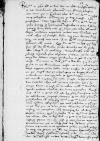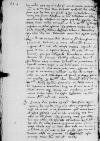Accepi superioribus diebus a Dominatione Vestra Reverendissima ternas, quibus hucusque per opportunitatem respondere non potui, distulique quousque hunc fratrem meum pro ⌊sorore mea vidua⌋ ad ⌊Montem Regium⌋ mitterem, exspectans meliorem viarum commoditatem, quae tamen adhuc non successit. Nolui itaque eum detinere diutius, utque nunc eundem meo nomine Dominationem Vestram Reverendissimam inviseret reverenterque salutaret illi iniunxi.
Quae Dominatio Vestra Reverendissima in ⌊⌋, quae datae sunt ipso 1535-12-06⌊die sancti Nicolai1535-12-06⌋ scribit de iuribus nostris, de quibus adeo magnificus dominus ⌊palatinus Marienburgensis⌋ videtur esse sollicitus, reicienda sunt ad futurum ⌊conventum⌋. Res haec non unius diei laborem exigit, quemadmodum et ipsa Dominatio Vestra Reverendissima censet.
Pro novis a domino ⌊Ioanne a Werden⌋, quae Dominatio Vestra Reverendissima pro sua in me benevolentia ⌊⌋, ne nuntius ad me veniret vacuus, magnam gratiam habeo. Mitto vicissim Dominationi Vestrae Reverendissimae legenda ⌊⌋, quae magnificus dominus ⌊Cornelius Scepperus⌋ ex ⌊Brugis⌋ ⌊Flandriae⌋ et ⌊⌋ cum ⌊domino Gotscalco⌋ ex ⌊Lunenburgensi⌋ conventu, ubi cum illo a ⌊caesare⌋ fuit orator, scripsit; ex his non contemnendam tempestatem adhuc nobis imminere cognoscet. cf. Stat. Theb. I 151 pugna est de paupere regno ⌊Lis est de paupere regnocf. Stat. Theb. I 151 pugna est de paupere regno ⌋. Commisi fratri, ut eadem et ⌊illustrissimo domino duci⌋ legenda praeberet; aliud non fert secum exemplum.
⌊⌋ Dominationis Vestrae Reverendissimae datas XV huius ⌊fratres Franciscani⌋ mihi hic reddiderunt. Impense faverem ⌊reverendissimo domino Plocensi⌋, quemadmodum ⌊dominus praepositus Dominationis Vestrae Reverendissimae⌋ scribit, ut Cracoviensem episcopatum assequeretur, ego tamen subdubito, et ipsemet in eis litteris, quas ex ⌊Vilna⌋ XXIIII Novembris ad me dedit; misitque mihi exemplum litterarum ⌊pontificis Romani⌋ ad serenissimum ⌊regem nostrum⌋, quod si forsan Dominatio Vestra Reverendissima non haberet, his adiunxi. Alia in litteris Dominationis Vestrae Reverendissimae vere Laconicis, quae responso egeant, non video nisi quod eam summam erga me benevolentiam, quam in omnibus suis litteris declarat, quanti faciam, exprimere et ne cogitatione quidem complecti possum, sic itaque me geram, ut illa me semper digniorem faciam.
Intellexi dominum ⌊castellanum Gdanensem⌋ filium suum cum filio ⌊olim domini Balinszki⌋ mittere ⌊Wittembergam⌋ decrevisse; quorsum hoc tendit, quis caecus non videt etc.
Ex ⌊conventu Petricovie[nsi]⌋ mihi a reverendissimo domino ⌊novo archiepiscopo Gneznensi⌋ ⌊⌋ redditae sunt, 1535-12-19⌊XIX huius1535-12-19⌋ datae, qui scribit, quod hoc in turbulento conventu sine fructu discessum et contra ecclesiasticos, ut bellicis expeditionibus interessent, et nescio quae alia proposita.
Dominus Deus ⌊senem nostrum principem⌋ et Dominationem Vestram Reverendissimam quam diutissim[e] sospitem et felicem conservet. Cuius paterno amori me ex corde commendo.

